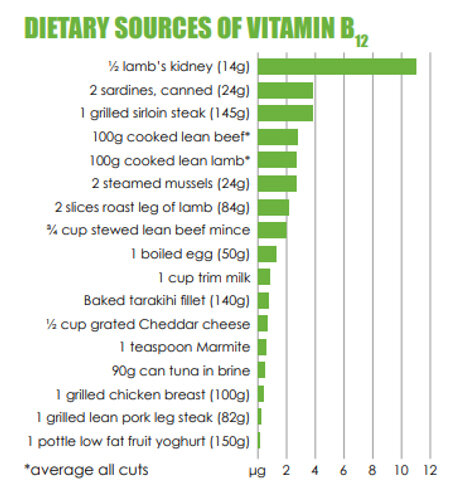Vitamin B12
Vitamin B12 plays an integral role in our bodies including energy levels, immunity, DNA synthesis, our nervous system, and growth and development in kids. It is found naturally in all animal sourced foods, and is added to some plant based foods.
Kidneys are a great source of vitamin B12. Click here for our Steak and Kidney Casserole
How much vitamin B12 do we need?
Vitamin B12 needs vary, increasing from childhood to adulthood, with a little extra needed during pregnancy and lactation.
Vitamin B12 absorption increases as intake increases, with varying rates between 11% to over 60% from animal sourced foods.
New Zealand’s last National Nutrition Survey on Adults (2008/09) estimated an inadequate intake of vitamin B12 in 14.1% of women, with higher prevalence in women aged 19-30 years (22.8%) and over a quarter (27%) of women aged 71 years and over.
*Recommended daily intake for vitamin B12 assumes bioavailability of 50% for healthy adults.
Who needs more?
People short of vitamin B12 may not have symptoms, so the following should have blood levels checked by their health professional:
Pregnant and breastfeeding women
Older people
Vegetarians, particularly vegans
Those with disorders of the stomach or small intestine such as Crohn’s disease*
People on certain long-term medications that reduce the amount of vitamin B12 the body uses from food*
*Under the advice of a health professional.
If we don’t have enough vitamin B12 in our blood, we can:
Feel tired
Look pale
Have little appetite
Lose weight
Can experience, over a longer period of time, tingling in hands and feet, a sore tongue and possible memory loss, confusion and depression
What about vitamin B12 for people who don’t eat animal foods?
As there are limited plant-based foods that are a source of vitamin B12, those following a diet with little to no animal products, particularly women who are pregnant or breastfeeding, are at greater risk of vitamin B12 deficiency and are recommended to take a vitamin B12 supplement under the advice of a health professional. As the options for vegan processed foods grows, it pays to check the ingredients list for options that provide a source of vitamin B12.
More information for health professionals and educators on vitamin B12 can be seen here.
References
National Health and Medical Research Council (NHMRC), Nutrient Reference Values for Australia and New Zealand including recommended dietary intakes: April, 2014
Ministry of Health. 2003. NZ Food NZ Children: Key results of the 2002 National Children’s Nutrition Survey. Wellington: Ministry of Health.
University of Otago and Ministry of Health. 2011. A Focus on Nutrition: Key findings of the 2008/09 New Zealand Adult Nutrition Survey. Wellington: Ministry of Health.
Mann, N.J., Li, D., Sinclair, A.J., et al. (1999). The effect of diet on plasma homocysteine concentrations in healthy male subjects. Eur J Clin Nutr, 53: 895-899.
Ministry of Health. (2006). Food and Nutrition Guidelines for Healthy Pregnant and Breastfeeding Women: A background paper. Wellington: Ministry of Health.
New Zealand Food Composition Database 2019. New Zealand Food Composition Database Online Search. The New Zealand Institute for Plant & Food Research Limited and Ministry of Health.



